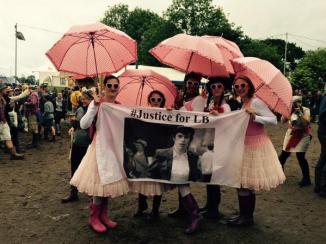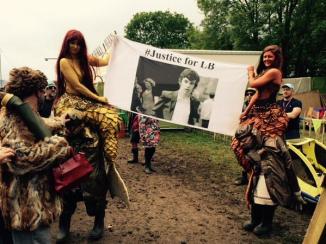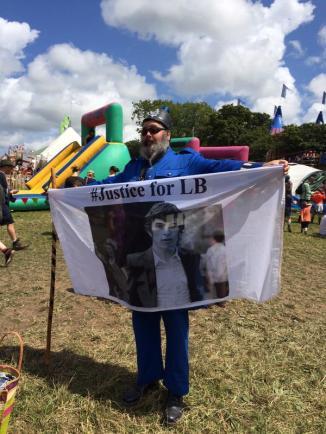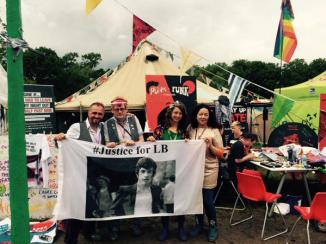Following on from our last pre-Glastonbury post, today we’re back with more from Dan Goodley and Rebecca Lawthom. A few highlights in snaps are dotted throughout the post, check out twitter for more.

Back to Worthy Farm to reclaim our humanity: #JusticeforLB and the productive potential of debility politics
Dan Goodley (University of Sheffield) and Rebecca Lawthom (Manchester Metropolitan University)
At lunchtime on the 8th May 2015, in the UK, the message was clear. The Conservative party were in power. And with a majority. The sense of doom and misery around our university campuses was palpable. Colleagues cried. One, a mother of a young disabled woman, shed tears of sorrow and anger as she struggled to think about her daughter’s future. Others we spoke to were incandescent with rage at the lack of opposition offered by the Labour party. Some, so it seemed, were visibly nervous: what would happen now that the Lib Dems could no longer put any blocks on the austerity measures of the Conservatives? What would become of essential services and benefits that literally were – and are – a matter of life and death for disabled people? What changes would we witness to health, social care and education now that the neoliberal agenda of the government could, as the new Education minister arrogantly proclaimed, be put into strategy and practice without being hindered by coalition politics. To borrow from the words of Lauren Berlant (Berlant, 2004, 2007, 2010, 2011), austerity policies are a particular kind of cruel optimism: an idea that the reduction of public expenditure and the rolling back of welfare necessarily permits the autonomous, ready and able worker to step in (and we mean step in, not roll in) to the breach; to fill the empty spaces left by a receding welfare system. The reality of #austerityasideology is, of course, very different to the optimistic ways in which it is served cold to the masses. As Berlant points out these are contemporaneous times of slow death: people attempting (and imagining) to work themselves out of poverty or towards wealth (and self-sufficiency) but actually doing so in ways that literally wear our their bodies and minds. For disabled people, of course, their deaths risk being even quicker in a time of government welfare cuts, while their relationships with the cruel optimism of work are often complicated. What happens when you cannot work? What happens when you fail? For many disabled people the welfare state provides essential support, recognition and connectivity. Now, as work overtakes care (and we mean care in its most feminist sense of mutuality and interdependence), one wonders what might happen to those left on the peripheries of communities of employment and self-sufficient living. Since the 8th of May we have felt ever more worried, concerned and angry about austerity. Fortunately, we have come across two sources of hope.
The first is social theory. We are with bell hooks on the transformative potential of social theory. One example of hope is offered by the recent writings by Jasbir Puar (Puar, 2009, 2010, 2011, 2012). She suggests that our contemporary times are marked by debility: the failings of bodies to not only work themselves out of poverty but also failings of bodies to match up to the neoliberal imperative demanded by cruelly optimistic ideologies of advanced capitalism. In this sense then, as we have argued elsewhere along with our mate Katherine Runswick Cole (Goodley, 2014; Goodley, Lawthom and Runswick Cole, 2014), all of us (whether disabled or not) are scarred by forms of neoliberal-ableism: standards of working and consumption that we all fail to match up to. But, this notion of failure is recast by Puar as a possibility: a shared identity and political position of debility. This got us thinking; what does a politics of debility look like? How might we harness it, come together and collectively agitate around a politics of debility?
Answers to these questions were offered by a second source of hope: a coming together of Glastonbury music festival 2015 (at Worthy Farm, Pilton, Somerset) and the disability campaign JusticeforLB.

Who is LB?
LB is short for Laughing Boy, the name used online for Connor Sparrowhawk.
Connor was a fit and healthy young man, who loved buses, London, Eddie Stobart and speaking his mind.
Connor had autism and epilepsy.
On the 19 March 2013, he was admitted to hospital (Slade House Assessment and Treatment Unit run by Southern Health NHS Foundation Trust).
He drowned in the bath on 4 July 2013. An entirely preventable death.
This week will mark the second year anniversary of his death. And still there has been no adequate apology nor acknowledged accountability on the part of those responsible for LB’s death. Read that again; ‘an entirely preventable death’; the findings of an independent report. LB’s mother and disability studies researcher Dr Sara Ryan reported in a recent blog on Updating the Update. Of the update. In this post she recaps ‘progress’ so far, summarising:
So. That’s it really. When we sadly started #107days again this year, we naively thought some of these investigations would be completed during this time. It’s now clear that this ain’t going to happen.
It’s all a pile of cock rot really.
A pile of cock rot indeed. In contrast, the JusticeforLB campaign has demonstrated a collective integrity and affirmative quality since its emergence as a response to LB’s death. Our family, the Lawthom-Goodleys, have had the chance to offer a tiny contribution to the campaign and this is what we wrote for the campaign website on the 24th June.




On Monday of this week we returned from the festival. It was a huge success in terms of raising awareness of LB’s campaign. We managed to wade through mud, rain showers, crowds, Florence and the Machine, The Sleaford Mods, Pharrell, Suede, noodle bars, beer tents, hippies, pill heads, Green activists, mashed up punters, the whole smorgasboard of humanity that appeared to fill the hills, tents, toilets and valleys of Glastonbury. And we spoke, connected, shared and raged with a number of revelers. These included …
- The awe inspiring @StayUpLateUK – an organisation set up to support the night time partying activities of people with learning disabilities. Their stall in the Greenfields offered to punk and funk up the outfits of Glasto-goers whilst simultaneously raising issues of inclusion. We loved their t-shirts. Especially the one that read ‘Who the funk voted Tory?’

- An engaged Greenpeace activist whose conversation started with a consideration of over-fishing and ended with thoughts on another aspect of sustainability: that of the human race in a time of welfare cuts.
- A sobbing social worker who told us that she had spent the whole festival looking for the #JusticeforLB flag only for us to fortuitously stumble upon us in a late bar near the Pyramid stage as we avoided the Kanye West crowds. We shared a tear and some profanity together for a while.
- Numerous inquisitive strangers who approached to ask about the flag – ‘We’re glad you asked’ we told them when they approached us. ‘I’m glad I asked’ was a common response. As was a bearhug. And a kiss.
- A mum who had lost her daughter to illness and told us how she had tried to fight the system in court. All she had wanted then was a sorry. And now that had not come she was after something more; justice.
- A chap who was worried about social care – post election – for his own mother and could therefore, as he put it, totally empathize with LB’s campaign.
- And then, just when we thought it could not get any more productive in terms of our festival activism, LB’s flag was found by his sister and she came up to find us. So we danced around LB’s flag, together, for a while. #Legend.

All of these stories of engagement illuminate a particular kind of collective activism and agitation in a time of austerity. And at the epicenter of this activism is the JusticeforLB campaign. The campaign and our human encounters described above capture the potency of coming together around a politics of debility. This is a collective that brings together many people who have become the human collateral of years of poor welfare provision, disabling conditions of everyday life and latterly, the effects of austerity. This is a collective that has care, respect, welfare, support, recognition, humanity, interdependence, mutuality, fairness, justice as its leitmotifs. And these are all elements of our shared debility, vulnerability and dependence on one another.
Tragically, LB’s death was not slow. It was quick. It happened in a short space of time in an assessment and treatment unit. Here is another institution bound up in the lies of cruel optimism: that asylums will rehabilitate inmates. That service users will become active producers. That clients will become citizens. Perhaps we know one good thing about austerity and the cuts: that poor institutions will be closed down alongside good ones – but this is really is like searching for gold dust in a cesspool of shite. JusticeforLB brings together many of us fighting austerityasideology under a banner of debility because LB starkly illustrates the kinds of human beings valued or negated by neoliberal-ableist capitalism, in a time of cuts. LB’s death is not simply about the politics of disability, nor the self-advocacy movement, nor the activism of families and allies. LB’s death strikes at the very heart of a time of debility that is ever more enforced through the lies of austerity as necessary to reduce national debt and to make individual citizens responsible for their own lives. We are all austerity bodies now. And we all risk being jettisoned from narrow forms of citizenship that cling to ableist framings of what it means to be human. But surely, isn’t being human more than working hard and shopping enough? It is about reclaiming our communities; finding moments of connection and developing new conversations with would-be comrades.



This reclaimed community sounds a lot like Glastonbury festival. We are firmly of the view that reclaiming our humanities in a time of austerity is absolutely essential. And LB, his family and their allies have shown us a productive way forward. Now is our time of debility politics.
Finally, as a wonderful aside, it is worth noting that as we were making our way down to Glastonbury on June 24th, Disability protesters stormed into parliament to voice their anger at government plans to cut the Independent Living Fund.
Ha! #Legends. It would seem that this debility movement, to use the masters terms, has some legs to it.
References
At the main stage:
#JusticeforLB http://justiceforlb.org/
#107Days https://107daysofaction.wordpress.com/
On the smaller stages:
Berlant, L (2010). Cruel optimism. In M. Gregg and G.J. Seigworth. (Eds). The Affect Theory Reader. Durham, North Carolina: Duke University Press. (pp93 -117)
Berlant, L. (2004). Critical inquiry, affirmative culture. Critical Inquiry, 30 (2), 445-451.
Berlant, L. (2007). Slow Death: Sovereignty, Obesity, Lateral Agency. Critical Inquiry 33, 754 – 780.
Berlant, L. (2011). Austerity, Precarity, Awkwardness: Blog posting. Retrieved on 14th May 2013
Goodley, D. (2014). Dis/ability studies. London: Routledge.
Goodley, D. Lawthom, R. & Runswick-Cole, K. (2014) Dis/ ability and austerity: beyond work and slow death, Disability & Society, 29:6, 980-984, DOI: 10.1080/09687599.2014.920125 .
Puar, J.K. (2009): Prognosis time: Towards a geopolitics of affect, debility and capacity, Women & Performance: A journal of feminist theory, 19 (2), 161-172
Puar, J.K. (2011). “Coda: The Cost of Getting Better: Suicide, Sensation, Switchpoints.” GLQ, 18 (1), 149–58.
Puar, J.K. (2010). Ecologies of Sex, Sensation, and Slow Death. Periscope, 22nd November 2010.
Puar, J.K. (2012). Precarity Talk: A Virtual Roundtable with Lauren Berlant, Judith Butler, Bojana Cvejic;, Isabell Lorey, Jasbir Puar, and Ana Vujanovic, TDR: The Drama Review 56 (4), 163- 177.






























